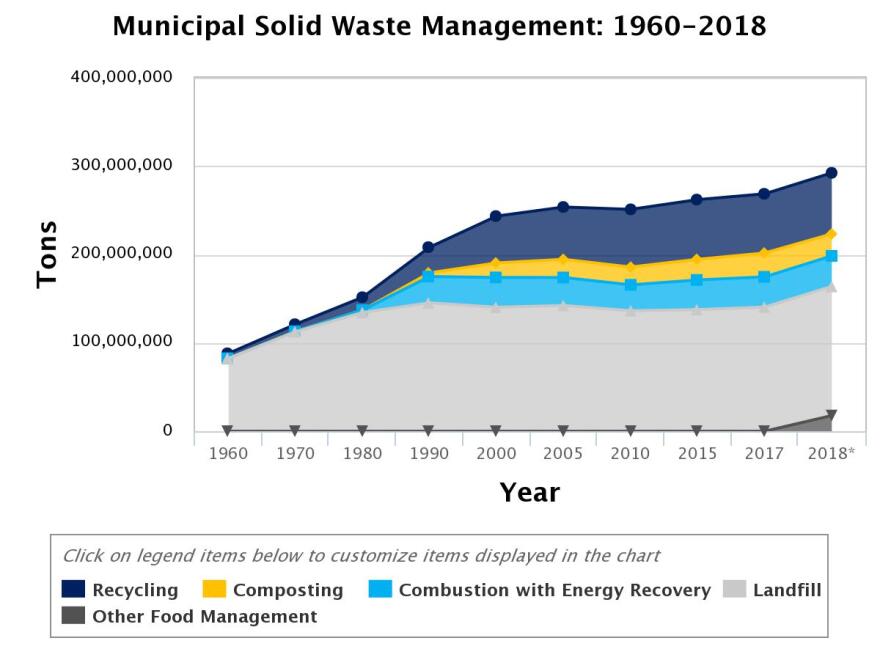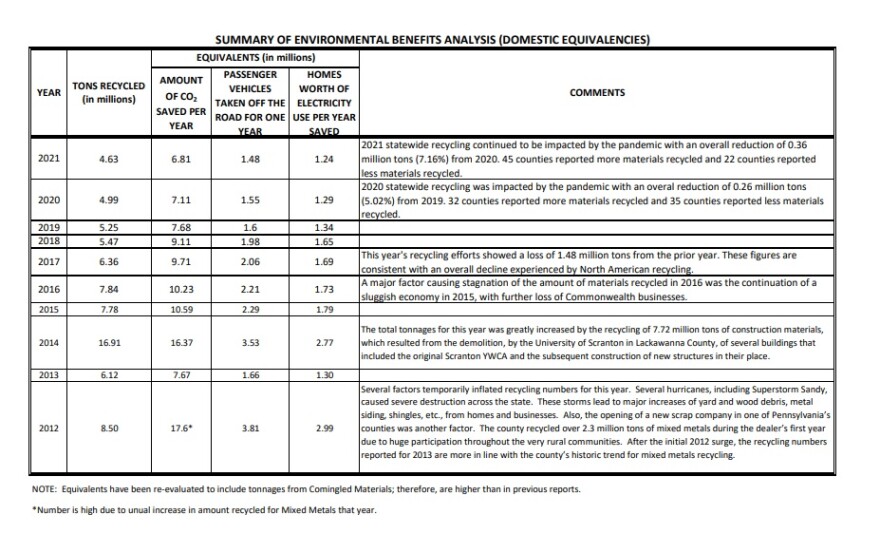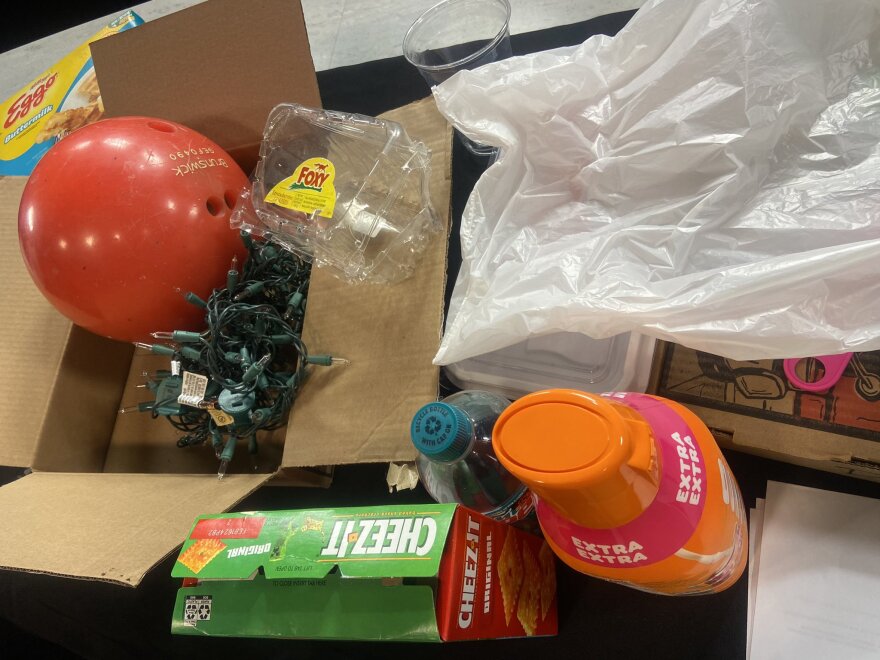BETHLEHEM, Pa. — When bowling balls or string lights end up in a recycling bin, it’s often because of "wish-cycling," Adrienne Fors said.
- While recycling is important, many don't recycle correctly
- Recycling incorrectly can cause tangles and contamination
- Residents should check with their hauler to confirm what is accepted
“Unfortunately, while that's something that is exciting to think about, ‘I'm doing a good job and recycling something that's plastic,’ [string lights] would be what we call a 'tangler,'” said Fors, senior community relations specialist for Waste Management’s greater mid-Atlantic region. “ … Things like Christmas lights, hoses or plastic bags — when they go up that star wheel, it generates a kind of congestion and it stops the wheels from turning.
“When you have those wheels stopping, you're having to shut down the entire plant and now your recycling process is stopped until everybody goes in there and cuts everything out and has to restart the whole system all over again.”
Hoping or wishing that an item is recyclable, without actually confirming it, can do more harm than good, and it’s an increasing issue for Lehigh Valley haulers, as well as the recovery facilities where those items are sorted. As residents country-wide continue to increase their trash output, the need to recycle — and do so correctly — is critical.
“Bowling balls seem to end up in our recycling,” Fors said. “For some reason, folks think those are recyclable and I'm sad to say they are not.”
It’s important for residents to check with their hauler to find out which items are acceptable and which aren’t. It can be confusing, but some manageable rules and common sense can help.
“Some of the ways that we can keep things simpler for ourselves is to remember to: keep it clean, keep it dry, keep it free of plastic bags,” she said.
How much waste do we generate?
Americans created 292.4 million tons of municipal solid waste in 2018, the most recent year of data available, according to the Environmental Protection Agency. That’s 4.9 pounds per person per day.
“Of the [municipal solid waste] generated, approximately 69 million tons were recycled and 25 million tons were composted,” according to the agency. “Together, almost 94 million tons of [municipal solid waste] were recycled and composted, equivalent to a 32.1% recycling and composting rate. An additional 17.7 million tons of food were managed by other methods.”
But the vast majority of refuse is still ending up in a landfill.

More recent data is available at the state level. In 2021, more 4.63 million tons of recyclable materials were collected and processed in Pennsylvania, according to the state Department of Environmental Protection. However, numbers are trending in the wrong direction, showing a more than 7% drop from the year prior.
“2021 statewide recycling continued to be significantly impacted by the pandemic,” according to the agency. “In 2021, 44 counties reported more materials recycled and 23 counties reported less materials recycled.
“As we move further from the impacts of the pandemic, we expect the increases in recycling that many counties reported in 2021 to continue into 2022.”

Leigh and Northampton counties collected 142,568 and 138,308 tons of recycled materials in 2021, respectively, state data shows.
‘The desire isn't really there’
Cougle's Recycling in Hamburg, Berks County, accepts recyclable materials from Lehigh, Northampton, Berks and Schuylkill counties.
“All of the material that would be in the curbside bin is brought to our facility,” said Tiffany Macaulay, one of the owners of the family business. “We are sorting it out, getting rid of what's not supposed to be in there, and then we are preparing it to be reused.”
Last year, Cougle's recycled more than 48,000 tons of paper products, according to the company’s website. That translates to saving more than 338 million gallons of water, 828,000 trees, 22.5 million gallons of oil and preventing more than 28.6 million pounds of air pollution.
While wish-cycling can cause tangles and contamination, the motivation behind it is often good, if misguided. However, there are also some residents who seem to flaunt the rules just to get rid of their garbage.
“Some of the ways that we can keep things simpler for ourselves is to remember to: keep it clean, keep it dry, keep it free of plastic bags.”Adrienne Fors, senior community relations specialist for Waste Management’s greater did-Atlantic region
“Without doubt there's some confusion,” Macaulay said. “But then there's also just blatant disregard.”
The center started accepting local recycling during the height of the COVID-19 pandemic as a public service, when area haulers paused. But then illegal dumping started.
“We had to stop it because we were receiving continuous garbage — cat trees and dressers and televisions and it was clearly labeled on our bins, what we wanted and what we didn't want, and very clearly labeled that the things they were putting there should not be put there,” Macaulay said. “But there was no real motivation for them to not do it and they just kind of wanted it out of their house, they wanted out of their lives, they wanted to get rid of it, and it was an easy way to do that.
“So, until there's some kind of incentive, motivation to do that, I think we're going to continue to be a little challenged by it. Just because the desire isn't really there.”
‘We think of it like baking a cake’
The majority of the Valley’s recycling is single stream, meaning that all recyclables are placed in one bin to be picked up by a hauler. While it can make it easier for residents by cutting down sorting time, it can also lead to contamination, tangles and wish-cycling.
“Knowing your recycling program and your municipality or with your hauler – every community is different and knowing what they accept what they can accept and what they can't accept is important,” Fors said. “At WM, particularly in our area here in the Lehigh Valley, we collect plastics one through seven, we can collect the tin cans, we can collect cardboard, paper as long as it's bigger than two inches.”
Education is often then key — just like Fors, Macaulay will visit local schools to teach students not only the importance of recycling, but also how to do it correctly.
“We think of it like baking a cake — you have the right ingredients in order to bake a successful cake,” she explained. “Your ingredients list is pretty much what is on your bin, it's your bin label.
“Make sure you're following that bin label in order to have a successful end product. Otherwise if you're putting things in it that they don't want and you're getting the contaminants you don't want — your cake’s not going to turn out well.”
While the analogy makes it easier for children to understand, some adults need it, too.
“I think it's an easy way for everybody to look at it,” she said. "As much as it seems like you could just throw that in there and we probably could do something with it, if it’s not on label or specifically restricted, there's a reason for that.”


